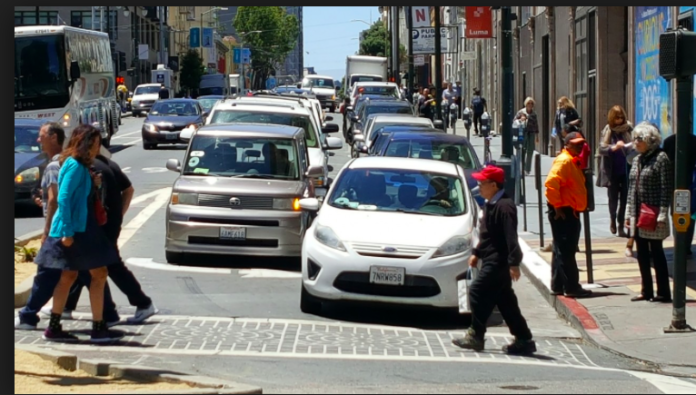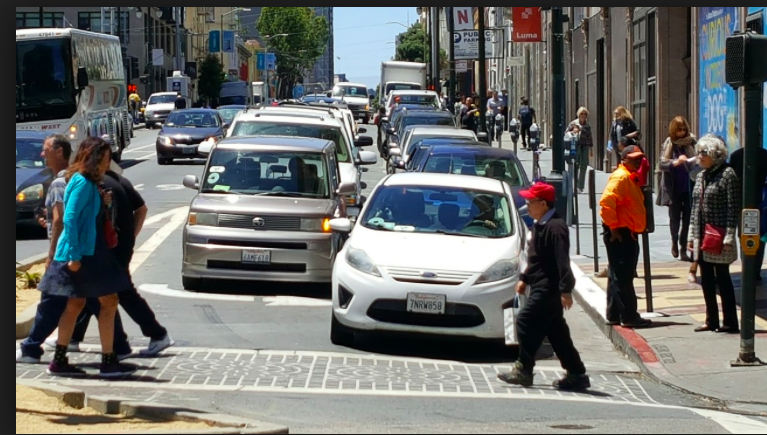
The supes listened for more than two and a half hours to testimony and expert reports on the city’s role in climate change – and it became very clear that San Francisco can’t reach its goals unless it can get a lot of Uber, Lyft, and delivery-app cars off the streets.
Climate change is a local issue as well as a global issue, and there are lots of elements. Speakers talked about everything from trees to vegetarianism, and all of those elements are important.

But from the city departments, the focus was on clean energy, buildings, and transportation.
The clean energy element demonstrated how critical is has been to shift the city’s major power supplier away from PG&E. As CleanPowerSF has become the default source of electricity, the city has made huge strides: In 2015, under PG&E, 45 percent of the city’s electricity was from renewable, non-GHG sources. By 2018, with CleanPowerSF reaching more customers, that was up to 70 percent, and if the rest of the city moves to local clean public power, that number can reach 90 percent by 2025.
The director of the Department of the Environment, Deborah Rafael, testified that it’s critical for the city to take control of the local grid – “that means public power.”
After covering this issue for more than 35 years, it’s a stunning change to see any representative of a mayoral administration say those words. The future of a sustainable climate is electricity, and the future of sustainable electricity is public control of resources.
The discussion of buildings focused on things like replacing natural gas with electricity. There was very little talk of the overall concept of growth: Should San Francisco promote, as it has, growth as an overall good – or should the city move to a more sustainable economy that might involve a lot fewer new office buildings? Rafael suggested at the end of the hearing that we need to consider “consumption” — well, yeah. And growth is part of that. Much bigger story.
I was most fascinated by the transportation element. The Municipal Transportation Agency says that half of all of the city’s greenhouse gas emissions come from transportation. And nearly half of all transportation in the city involves private vehicles.
Help us save local journalism!
Every tax-deductible donation helps us grow to cover the issues that mean the most to our community. Become a 48 Hills Hero and support the only daily progressive news source in the Bay Area.
The goal of the MTA is to get to 80 percent sustainable trips – that means trips on public transportation, not in private cars.
A handful of speakers, just a few, pointed out that there’s no way to make Muni work, to get people out of their cars, unless we do something to limit and control ride-hails and car-based delivery services. There are 45,000 Uber and Lyft vehicles in San Francisco. That – by definition – means we can’t improve public transit and reach the city’s goals or reducing emissions.
Muni is largely a surface-based system. Muni moves when the streets are clear; when the streets are clogged with private vehicles, Muni doesn’t move as fast.
Sup. Rafael Mandelman, who called the hearing, told me afterward that “In the name of climate sanity” the city needs to be able to limit the number of ride-hail and delivery vehicles.
Right now, it’s hard for the city to regulate Uber and Lyft – but that’s just because of a quirk in state law that the companies exploited. The state Legislature can easily change the situation.
Sen. Scott Wiener is trying to tell cities, in the name of the environment, to deregulate housing. It wouldn’t be easy to pass a bill allowing cities to regulate TNCs — but if San Francisco is going to have any remote change of meeting its greenhouse-gas goals, it has to happen.
I don’t think that’s an argument that’s been made in Sacramento, where our former mayor, who claims to be a staunch environmentalist, is now in the Governor’s Office.
“I would love that,” Mandelman said. So would a lot of people who ride Muni. Maybe we need a real political showdown: The future of the planet v. the profits of Uber and Lyft.
Everyone take a side.
